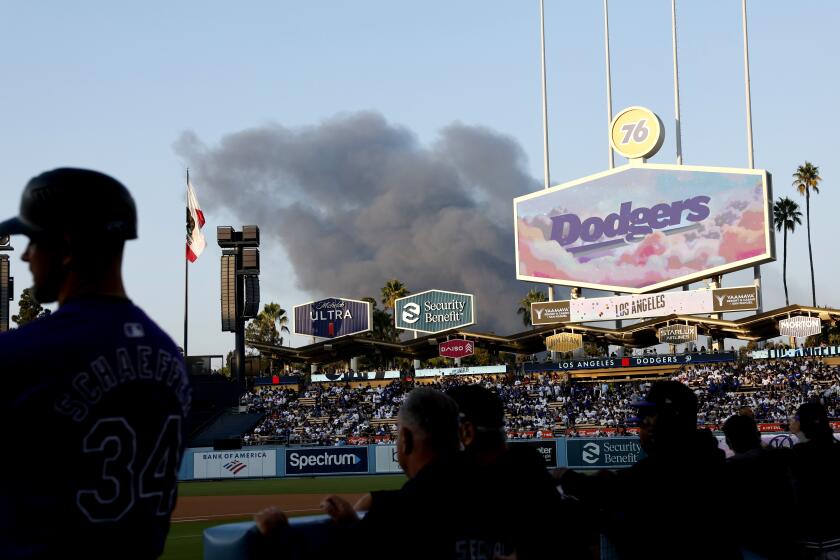Garcetti Is Ready to Take the Reins
He’s a Rhodes scholar, jazz pianist, photographer, blogger and environmental activist who managed to squeeze in a weekend trip to the Arctic Circle last year for Earth Day.
Eric Garcetti is also a bit of a comedian, unafraid to spastically dance around a stage parodying fashion models, as he did at a charity event in November.
Well-rounded, to say the least, the 34-year-old Garcetti on Wednesday may need all his skills -- particularly the diplomacy he studied at Oxford University -- when he convenes his first meeting as president of the Los Angeles City Council.
Late last year, in a behind-the-scenes power struggle, Garcetti wrested the job from Alex Padilla, who had held the title since mid-2001.
These have not been happy times for the council. The body was split over last year’s fractious mayoral race, besieged by media stories on its windbag tendencies and eclipsed by Mayor Antonio Villaraigosa’s long shadow.
“We’re going down the pathway of Congress,” Garcetti said in a recent interview. “People will say, ‘I love my member of Congress, but Congress stinks.’ I think we need to change that.”
Garcetti said his goal was to have the council take the lead on the core issues that have long faced the city and region.
Last week, Garcetti and Villaraigosa had dinner at Memphis, a Hollywood restaurant in an old Victorian home, where, Garcetti said, they shared their goals for the year ahead.
Garcetti’s list, based on talking with his colleagues: traffic and mass transit, housing and the homeless, and more police officers.
The mayor’s list was the same, Garcetti said, with the addition of taking over the city’s public schools in the No. 1 slot.
The two men have not always been on the same page. Garcetti endorsed the incumbent, James K. Hahn, last year, although he had campaigned and written speeches for Villaraigosa in the 2001 mayoral contest.
Yet Garcetti and Villaraigosa these days seem to be talking the same talk -- about “dreaming” of bigger things for L.A.
Hollywood was already densely populated before Garcetti took office in 2001 and has grown more so during his tenure. Today, with the addition of new housing, especially near transit, it serves as a kind of model for what both men say Los Angeles will become. There have, though, been complaints that Garcetti is pushing for growth too hard and too fast.
Garcetti was raised in the flatlands of Encino in a staunchly Democratic Party household. His father, Gil Garcetti, was a descendant of Mexican immigrants and a longtime prosecutor who in 1992 became Los Angeles County’s district attorney, serving two terms.
In school, Eric Garcetti excelled and emerged with an academic record that is unmatched at City Hall. At Columbia University, he studied urban planning and political science, earning a bachelor’s degree in political science and a master’s in international relations.
Later, as a Rhodes scholar, he attended Oxford University and the London School of Economics and began work on a yet-to-be defended doctoral thesis on nationalism in the African nation of Eritrea.
After he finished his schooling, his father urged Garcetti to pursue a career in composing jazz and Broadway music.
“I told him, ‘Let me offer you something few parents would. Why not take two or three years off and focus on your music?’ ” said the elder Garcetti. “ ‘If it turns out that you have the talent and the breaks, then great. If not, so what, you’re 29 or 30 and you have your Rhodes scholarship.’ By then, I think he really wanted to be involved” in politics.
After the son returned to Los Angeles in 1997, he took jobs teaching diplomacy and public policy at Occidental College and USC.
He moved to Silver Lake, where, he said, he rediscovered Los Angeles and began focusing on its politics.
In 2001, with some help on the stump from his father, Garcetti won a council seat in the 13th District, beating a competitive field that included former Assemblyman Scott Wildman and former Councilman Mike Woo.
During the campaign, Garcetti was not afraid to tout his progressive beliefs and confront global issues, particularly poverty and global warming.
As a council member, however, the challenge has been adjusting to district-oriented pothole politics -- some constituents say he could do better -- while still trying to tackle the big issues.
He has pushed for more affordable housing in Hollywood, created an anti-graffiti program for the district and, with Councilwoman Wendy Greuel, led the drive for business tax reform.
He is also, with other council members, in the midst of pushing for public financing of city campaigns to diminish the influence of campaign donors.
Elson Trinidad, a neighborhood activist in east Hollywood, praised Garcetti for being responsive to constituents. He also said he would like to see Garcetti “follow his own instincts” more often.
Garcetti can still sound like a professor. He is loquacious and conversant on a wide range of topics outside politics; his office is neat but crammed with history books.
In a nod to technology, he created a blog and makes entries every few days on his adventures on the council. It also includes lighter fare -- such as his 13th District dining recommendations (the pork banh mi at Gingergrass in Silver Lake, for example).
Around City Hall, he is known as a nice guy who can lean predictably left on some issues, such as workers’ rights, but then veer across the line and support business tax reform or the use of security cameras in public places. Yet, in reaching for the presidency, Garcetti demonstrated that he could throw an elbow.
He tried challenging Padilla last spring but couldn’t collect enough votes in time for the scheduled July 1 election for the presidency.
Padilla was reluctant to let go of the title while in the midst of his run at a state Senate seat this year. Last fall, Garcetti collected enough signatures on a motion to oust Padilla and confronted him with it.
With no choice, Padilla acquiesced, but publicly the two men said it was an orderly transfer of power and chose not to mention the backroom politics.
Garcetti sees the presidency as a chance to restore some order to a council that he believes does important work -- but is sometimes tarnished by its own behavior.
In December, while sitting in for Padilla as president, Garcetti watched as the majority of council members fled a meeting in progress to appear on television with the mayor at a news conference in an adjoining room. He was not pleased and said he was working on a plan to better run meetings.
In that vein, Garcetti spent time over the holidays watching videotapes of old council meetings -- a task that sounds rather tedious -- to see how 18-year former council President John Ferraro put his foot down at times.
Padilla counts Garcetti as a friend despite their tussle over the presidency.
He also said that Garcetti would find, as he did, that the era of term limits has made it harder for the council to reach consensus on tough issues.
“At the end of the day, when there’s $1 available and 15 districts that want it, it’s going to be tough,” he said. “In an earlier time, someone might have said, ‘My district will sacrifice this year, but we’ll make up for it next year.’ ”
Garcetti said he hoped to use the bully pulpit of the presidency to better explain to Angelenos how city government works and how council members spend their days. He said he believed the presidency was not a symbolic post and that he could use the job’s power to improve the city.
“City Hall is ground zero for changing things. People live in communities, and that’s where change first happens,” he said.
“I was raised with a strong -- not explicit but implicit -- ethic of social change, and I have always wanted, since I was younger, to make the world a better place.”
More to Read
Sign up for Essential California
The most important California stories and recommendations in your inbox every morning.
You may occasionally receive promotional content from the Los Angeles Times.










